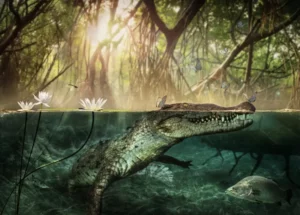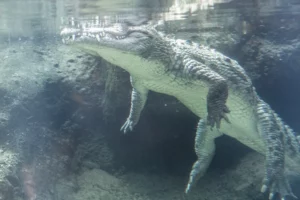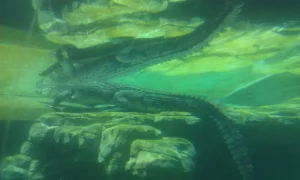Crocodiles have been observed spending time on both lands and in water. They enjoy immersing half of their body in water to cool off on warm days.
Underwater, crocodiles are unable to breathe. This is because they lack the gills that fish have. However, when fully submerged, they can hold their breath underwater for a considerable time. They can also float while breathing by sticking only the tip of their nose above the surface.
Isn’t that fascinating?
This blog elaborates on the topic of how crocodiles breathe underwater. We will discuss some of the most frequently asked questions pertaining to the subject in order to get to the heart of the matter more effectively.

Breathing mechanisms in crocodiles
Crocs cannot breathe underwater yet; they can stay there for a long time, more than we humans. So, briefly discussing the breathing mechanisms in crocs will be fascinating.
The breathing system in crocodilians consists of their heart, lungs, and a special valve, aka the Foramen of Panizza. This valve is between the left and right aorta of a croc’s heart, which can be manipulated to block the oxygen supply to the lungs, reducing their cellular respiration rate when underwater.
When crocodilians use the Foramen of Panizza underwater, their heart rate drops to 2-3 beats per minute, allowing them to save energy through reduced cellular respiration.
Crocodilians can also perform the most strenuous tasks while using no oxygen at all, thanks to anaerobic respiration. Crocs use glycolysis energy even when their musculoskeletal cells are completely depleted.
These adaptations allow crocodilians to stay underwater for an extended time and catch prey even when they are not “breathing.
Do crocodiles breathe underwater?
It’s time for some demystification. So let’s unveil the facts around if crocs breathe underwater.
Crocodilians do not breathe underwater. Instead, they have several adaptations in their breathing mechanisms that help them hold on to their breath underwater but not breathe there. So, while most of their body remains submerged in water, crocs keep their nostrils above the water level to breathe.
Do Crocodiles have Gills?

Crocodilians, being cold-blooded animals, must remain submerged (partially/ full) in the water or muddy soil. Let us find out do they have the gills to breathe underwater.
Crocodiles are reptiles that do not have gills. Instead, they have lungs and must breathe oxygen like humans. As a result, they keep their nostrils above the water’s surface the majority of the time. When fully submerged, they hold their breath for an extended period.
Do crocodiles breathe through the skin?
Like amphibians, crocs also live in and out of the water throughout their lives. This brings us to question if these reptiles also breathe through their skin.
Crocodilians, like other land animals, have lungs as respiratory organs. As a result, they breathe through their lungs rather than their skin. Having said that, crocodilians’ bodies are covered in hard scales that keep them from dehydrating.
Only amphibians can breathe through their skin. For example, frogs, toads, newts, and salamanders require constant moisture and thus lack scales on their bodies.
How long can a saltwater crocodile hold its breath underwater?

Like other crocodilians, saltwater crocodiles can stay underwater for as long as 2 hours. They can do so because they can reduce their heart rate to 2-3 beats per minute. This reduces the need for unnecessary cellular respiration.
This adaptation in crocs enables them to stay underwater for a prolonged time to catch prey or hide out.
How long can crocodiles stay underwater?
Crocodiles are incredible reptiles. They are one of the most fascinating large reptiles because of their highly adapted breathing mechanism.
Crocs can stay underwater for 10 to 15 minutes under normal conditions. They can, however, stay fully submerged for up to 2 hours at a time if absolutely necessary. Yet, they spend their entire lives in and out of the water.
Which animal can hold its breath longer underwater than crocodiles?
Crocs can stay fully submerged in water because they can hold their breath. Now, let’s look at other animals that can also hold their breath underwater.
According to records, the Cuvier’s beaked whale holds the record for holding its breath for the longest period underwater. The medium-sized whales‘ longest recorded dive was 138 minutes.
The southern elephant seals were considered the big winners in the breath-holding Olympics before Cuvier’s beaked whales. According to research, female elephant seals can hold their breath for up to two hours while diving more than 4,000 feet.
Some other animals that can be listed as the runner-ups in the breath-holding Olympics are listed below.
| Animals | Type | Breath-holding duration |
| Sperm Whale | Mammal | 2 hrs |
| Weddell Seal | Mammal | 1 hr |
| Marine Iguana | Reptile | 30 mins |
| Walrus | Mammal | 30 mins |
| Emperor Penguin | Bird | 18-20 mins |
| Orca | Mammal | 2-5 mins |
FAQs
Q: How do crocodiles breathe underwater?
A: Crocodiles cannot breathe underwater like fish do. They have to come to the surface to breathe air.
Q: Can crocodiles stay submerged for long periods of time?
A: Yes, crocodiles can stay submerged for extended periods of time, sometimes up to two hours.
Q: How do crocodiles stay underwater for so long?
A: Crocodiles are able to stay submerged by holding their breath. They have a special valve in their throat, called the palatal valve, which allows them to keep their mouths closed while still being able to breathe.
Q: Do crocodiles breathe through their skin?
A: No, crocodiles do not breathe through their skin. They rely on their lungs to extract oxygen from the air.
Q: How does the respiratory system of a crocodile work?
A: Crocodiles have a four-chambered heart, similar to mammals and birds. When a crocodile breathes, oxygen-rich air enters the lungs and is then circulated throughout the body via the bloodstream.
Q: Can crocodiles oxygenate their blood while underwater?
A: No, crocodiles cannot oxygenate their blood while underwater. They rely on the oxygen they obtain from breathing air at the surface.
Q: What happens if a crocodile doesn’t breathe for too long?
A: If a crocodile doesn’t breathe for too long, the amount of oxygen in their blood gradually decreases. This can lead to a decrease in energy and the need to come to the surface to breathe again.
Q: How do crocodiles release carbon dioxide underwater?
A: Crocodiles release carbon dioxide when they come to the surface to breathe. The carbon dioxide dissolves in the water and is carried away.
Q: Can crocodiles breathe underwater for an extended period of time?
A: No, crocodiles cannot breathe underwater for an extended period of time. They need to come to the surface to breathe in fresh air.
Q: Do all crocodilian species breathe the same way?
A: Yes, all crocodilian species, including alligators and gharials, breathe in a similar way. They have to come to the surface to breathe air.
Summary
The key takeaway of this post is that crocodilians do not breathe underwater. They cannot perform this action because they breathe through their lungs and do not possess gills. Yet, they remain submerged underwater for up to 2 hours because they can hold their breath underwater. Their ability to reduce their heart eater to an extremely low level enables them to do so.




